#Google Cache Checker Tool
Explore tagged Tumblr posts
Text
All-in-One SEO Tools: Boost Rankings, Traffic, and Visibility
Boost Your SEO Success with Our Comprehensive Bono SEO Tools. Discover Keywords, Optimize Content, and Skyrocket Rankings. Try It Today!

#digitalmarketing#seo#local seo#seo agency#seo expert#seo services#bonoseotools#mozranktracker#youtube tools#website seo#website services#seo tools#backlink checker#da pa checker#domain authority checker#wordpress theme detector#google cache checker#google index checker#credit card generator#hosting checker#robot.txt generator#article rewriter#domain age checker#page authority checker#youtube description generator
0 notes
Link
Google Cache Checker - Monitor Your Website's Google Indexing
#Google Cache Checker#Free Micro Tools#Google indexing#SEO tools#website caching#SEO strategy#search engine indexing
0 notes
Text
Learn about negative SEO tactics and how to protect your website from malicious actions
In today’s highly competitive online landscape, businesses and website owners face not only the challenge of optimizing their websites for search engines but also the threat of negative SEO tactics. Negative SEO refers to the practice of using unethical and malicious strategies to harm a competitor’s website’s search engine rankings and online reputation. This dark side of search engine optimization can lead to devastating consequences for innocent website owners.
In this article, we will explore various negative SEO tactics and provide valuable insights on how to safeguard your website from such attacks.
Link Spamming and Manipulation
One of the most common negative SEO tactics is the mass creation of low-quality, spammy backlinks pointing to a targeted website. These malicious backlinks can lead search engines to believe that the website is engaging in link schemes, resulting in penalties and ranking drops. Website owners must regularly monitor their backlink profiles to identify and disavow any toxic links.
Content Scraping and Duplication
Content scraping involves copying content from a target website and republishing it on multiple other sites without permission. This can lead to duplicate content issues, harming the original website’s search rankings. Regularly monitoring your content for plagiarism and submitting DMCA takedown requests can help address this problem.
Fake Negative Reviews
Negative SEO attackers may leave fake negative reviews on review sites and business directories to damage a website’s reputation. Monitoring and responding to reviews promptly can help mitigate the impact of such attacks.
Distributed Denial of Service (DDoS) Attacks
DDoS attacks overload a website’s server with an excessive amount of traffic, causing it to become slow or crash. Implementing DDoS protection services can help safeguard your website against such attacks.
Regularly Monitor Backlinks
Use tools like Google Search Console and third-party SEO software to monitor your website’s backlink profile. Regularly review and disavow toxic links to prevent negative SEO attacks based on link spamming.
Secure Your Website
Ensure your website is secure with HTTPS encryption and robust security measures. This will help protect your website from hacking attempts and potential negative SEO attacks like content manipulation.
Frequently Check for Duplicate Content
Use plagiarism checker tools to identify if your content has been copied elsewhere. If you find duplicate content, reach out to the website owners to request removal or use the Google DMCA process.
Implement Review Monitoring
Keep an eye on reviews and mentions of your brand across various platforms. Respond professionally to negative reviews and report fake reviews to the respective platforms for removal.
Optimize Website Performance
A fast-loading website can better withstand DDoS attacks. Optimize your website’s performance by compressing images, using caching, and leveraging Content Delivery Networks (CDNs).
Regularly Backup Your Website
Frequent website backups will ensure that even if an attack occurs, you can quickly restore your website to its previous state without losing valuable data.
Use Webmaster Tools and Analytics
Stay vigilant by setting up alerts in Google Webmaster Tools and Google Analytics. These alerts can notify you of sudden drops in website traffic or other suspicious activities.
Conclusion
As the digital landscape continues to evolve, negative SEO tactics remain a persistent threat. Understanding these malicious strategies and proactively taking steps to protect your website is crucial for every website owner.
Discover countermeasures against negative SEO tactics, safeguarding your site from harm. Shield your website with insights from an experienced SEO company in Chandigarh for robust defense strategies.
2 notes
·
View notes
Text
Top SEO Plugins for WordPress You Should Use in 2025

Having a WordPress website is only the beginning—getting it discovered by search engines is where the real magic happens. With millions of websites competing for attention, optimizing your site for SEO is essential.
Thankfully, WordPress has an incredible range of SEO plugins that simplify the process. Whether you’re a blogger, business owner, or eCommerce seller, these tools help you rank higher, drive more traffic, and grow faster.
In this guide, we’ll cover the top SEO plugins for WordPress in 2025, how they work, and why you should consider installing them. For professional setup, a trusted WordPress Development Company in Udaipur can help you implement them flawlessly.
1. Yoast SEO
Best for: All-purpose SEO, beginners to advanced users
Yoast remains one of the most popular SEO plugins for WordPress, and in 2025, it’s better than ever.
Key Features:
On-page SEO suggestions
Keyword optimization
XML sitemap generation
Meta title and description editor
Breadcrumbs and canonical URLs
Yoast offers a real-time SEO analysis tool that guides you as you create content—perfect for bloggers and marketers alike.
Free version available | Premium from $99/year
2. Rank Math
Best for: Power users and those who want more control
Rank Math is quickly becoming the new favorite in the WordPress SEO world—and for good reason.
What sets it apart:
Track up to 5 keywords per post (even in the free version)
Built-in schema markup
Advanced redirection manager
Integration with Google Search Console & Analytics
Local SEO module for businesses
It’s powerful, lightweight, and packed with features that were previously only available in paid plugins.
Free version available | Pro from $59/year
3. All in One SEO (AIOSEO)
Best for: Business websites, eCommerce stores
AIOSEO is another long-standing plugin trusted by millions. Its latest 2025 update focuses on performance and deeper WooCommerce integration.
Highlights:
TruSEO on-page analysis
Smart XML sitemaps
SEO audit checklist
WooCommerce SEO tools
Social media integration with Open Graph and Twitter Cards
The setup wizard makes it easy to configure in minutes—ideal for beginners.
Free version available | Pro from $49/year
4. SEOPress
Best for: Developers and agencies
SEOPress is a clean, lightweight, and privacy-focused SEO plugin that rivals both Yoast and Rank Math in power.
Notable features:
Content analysis and optimization tips
Schema (structured data) integration
Broken link checker
Google Analytics and Tag Manager integration
White-label options for agencies
If you want an ad-free, developer-friendly SEO solution, SEOPress is a strong contender.
Free version available | Pro from $49/year
5. Schema Pro
Best for: Advanced schema markup
Structured data helps Google understand your content better—and plugins like Schema Pro make it easy to implement.
What it does:
Adds rich snippets (reviews, FAQs, recipes, etc.)
Supports 20+ schema types
Integrates with Elementor and other builders
Visual interface for mapping schema fields
Great for businesses and blogs that want to improve click-through rates with rich results.
Premium only | Starts at $79/year
6. Redirection
Best for: Managing 301 redirects and broken links
SEO isn’t just about adding keywords—it’s also about maintaining clean URLs. Redirection helps manage URL changes and avoid 404 errors.
Key Features:
Easy setup of 301 redirects
Monitor 404 errors
Conditional redirects based on login status, browser, or referrer
Full logging for troubleshooting
It’s a lightweight plugin that plays a big role in preserving SEO equity during site migrations or redesigns.
Completely free
7. WP Rocket (for Speed & Core Web Vitals)
Best for: SEO through performance optimization
While not an SEO plugin in the traditional sense, WP Rocket improves page speed and Core Web Vitals, both of which are crucial for SEO rankings in 2025.
Features:
Page and browser caching
File minification
Lazy loading for images
CDN support
Database cleanup
Google ranks fast sites higher, so using WP Rocket in tandem with SEO plugins is a smart strategy.
Premium only | Starts at $59/year
8. Broken Link Checker
Best for: Fixing dead links that hurt SEO
Broken links frustrate users and damage your SEO. This plugin scans your posts, pages, and comments to detect and fix them.
Benefits:
Scans internal and external links
Notifies you via dashboard and email
Offers quick editing interface
It’s a must-have for content-heavy websites and blogs.
Free version available
9. Google Site Kit
Best for: Integrating Google’s tools into WordPress
Google Site Kit brings essential SEO tools right into your WordPress dashboard.
What it connects:
Google Search Console
Google Analytics
PageSpeed Insights
Google AdSense
Tag Manager
Use it to monitor traffic, performance, and crawl errors in one place—no code needed.
Completely free
10. Squirrly SEO
Best for: Beginners and content creators
Squirrly is like having an SEO coach inside your dashboard. It’s ideal for non-technical users who want real-time tips as they write.
Features:
SEO Live Assistant with suggestions
Keyword research built-in
Weekly site audits
Competitor analysis
Google SERP checker
It also helps you optimize content for both users and search engines.
Free version available | Pro from $71.99/year
Final Thoughts
If you’re using WordPress, you already have a head start in SEO—but the right plugins can elevate your site’s performance, visibility, and traffic dramatically.
0 notes
Text
Track Your Website’s Google Ranking with ToolsPing’s Free SERP Checker Tool
In the digital age, visibility on Google determines the success or failure of a website. Whether you run a blog, an eCommerce store, or a corporate website, your position on search engine results pages (SERPs) can directly affect your traffic, leads, and ultimately your revenue. Understanding where your site ranks for targeted keywords is vital — and that’s where ToolsPing’s Free SERP Checker Tool comes in.
At ToolsPing, we offer a powerful yet simple solution for anyone looking to monitor and optimize their SEO performance without the hassle of registration, downloads, or expensive software subscriptions. Our Free SERP Checker Tool is designed for immediate use, offering real-time insights into your keyword rankings on Google — completely free of charge.
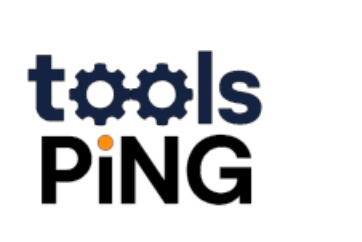
What Is a SERP Checker Tool and Why Do You Need One?
A SERP (Search Engine Results Page) Checker Tool is an SEO utility that allows you to analyze where your website ranks on Google for a specific keyword or search phrase. These tools are essential for:
Tracking SEO campaigns
Analyzing keyword performance
Monitoring competitors
Understanding organic visibility
Identifying SEO opportunities
Whether you're an SEO specialist or a business owner, a Free SERP Checker Tool provides essential data that guides your content strategies and optimization efforts.
Introducing ToolsPing’s Free SERP Checker Tool
Our Free SERP Checker Tool at ToolsPing is an intuitive, easy-to-use platform tailored for users who want instant results without any learning curve or login barrier.
Key Features:
Instant Keyword Position Tracking Enter your target keyword and domain, and our tool will instantly display where your site ranks on Google.
No Sign-Up Required Start checking your rankings right away — no email, no registration, no waiting.
Multi-Device Compatibility Use it on desktop, tablet, or mobile. Our platform is responsive and optimized for all devices.
Global Search Options Track keyword rankings in various countries and regions to support your international SEO strategies.
Clean, User-Friendly Interface Our tool is designed for clarity. Whether you're a seasoned SEO expert or a beginner, you’ll navigate with ease.
Why Use ToolsPing’s Free SERP Checker Tool Over Others?
Many SERP tools on the market come with hidden limitations — usage caps, mandatory sign-ups, or premium-only features. At ToolsPing, we offer complete transparency and accessibility.
Here’s why we stand out:
Truly Free: No hidden charges, no freemium traps — just pure SERP data at no cost.
Real-Time Results: Get accurate, live Google ranking data, not outdated cached info.
Unlimited Searches: Check as many keywords and domains as you want, any time.
Privacy Guaranteed: No data tracking, no personal information collected.
This makes our Free SERP Checker Tool the ideal choice for students, small business owners, digital marketers, and SEO professionals alike.
How to Use the Free SERP Checker Tool on ToolsPing
Getting started is as easy as it gets:
Visit ToolsPing’s Free SERP Checker Tool page.
Enter your domain name (e.g., www.yoursite.com).
Type in the keyword you want to check.
Select your target country (optional).
Click the "Check SERP" button.
Within seconds, you’ll see exactly where your website ranks for that keyword on Google.
Benefits of Regularly Checking Your Google Rankings
Using a Free SERP Checker Tool regularly ensures that you stay informed about your SEO health. Here are some of the key benefits:
Track Progress Over Time
Monitor how your rankings improve as you implement new SEO strategies or publish fresh content.
Identify Drop-Offs Quickly
Spot when rankings fall so you can take immediate corrective action.
Understand Competitor Movements
See how you compare with competitors and respond to shifts in search position.
Optimize Content Efficiently
Focus your optimization efforts on keywords that matter most and yield the best ROI.
Improve Local and Global Reach
Track location-specific keywords to tailor content for regional SEO campaigns.
Who Should Use ToolsPing’s Free SERP Checker Tool?
This tool is perfect for:
Freelancers and bloggers optimizing their articles and content
Business owners wanting to track product or service visibility
SEO agencies managing client keyword positions
eCommerce websites analyzing product keyword performance
Students learning about search engine marketing in real time
If you care about search visibility, you need a reliable, real-time, and Free SERP Checker Tool — and ToolsPing delivers exactly that.
Boost Your SEO Strategy with ToolsPing
Ranking well on Google doesn’t happen by chance. It requires consistent effort, strategic insights, and reliable tools. With ToolsPing’s Free SERP Checker Tool, you get the clarity and direction needed to improve your search performance without paying a cent.
Our mission is to empower webmasters, content creators, and digital marketers by providing fast, accurate, and free SEO tools that make a difference.
Don’t let your website’s potential go untapped. Stay on top of your rankings and adapt your SEO strategies with real data. ToolsPing is your trusted partner in navigating the ever-changing world of search engine optimization.
0 notes
Text
```markdown
The Ultimate Guide to SEO Scripts on GitHub
In the vast world of digital marketing, Search Engine Optimization (SEO) plays a pivotal role in driving organic traffic and improving online visibility. One powerful tool that has emerged to aid in this process is GitHub, a platform not only for code hosting but also for sharing and collaborating on projects. In this article, we will explore some of the best SEO scripts available on GitHub that can help you enhance your website's performance and ranking.
Why Use SEO Scripts from GitHub?
1. Community-Driven: GitHub is a community-driven platform where developers share their knowledge and tools. This means the scripts are often well-maintained and updated regularly.
2. Customizability: Since these scripts are open-source, you have the flexibility to modify them according to your specific needs.
3. Cost-Effective: Many of these scripts are free to use, making them an affordable solution for businesses of all sizes.
Top SEO Scripts on GitHub
1. SEO Audit Tool
This script allows you to perform a comprehensive audit of your website, identifying issues that could be affecting your SEO. It checks for broken links, missing meta tags, duplicate content, and more. By addressing these issues, you can improve your site's overall health and search engine rankings.
2. Keyword Research Tool
Keyword research is crucial for any SEO strategy. This script helps you find relevant keywords for your content by analyzing search trends and competitor data. With accurate keyword data, you can create content that resonates with your target audience and ranks higher in search results.
3. Backlink Checker
Backlinks are a significant factor in determining a website's authority and ranking. This script allows you to check the quality and quantity of backlinks pointing to your site. It also provides insights into which sites are linking to you and how those links are structured.
4. Site Speed Optimization Script
Page speed is another critical factor in SEO. This script helps you optimize your website's loading time by compressing images, minifying CSS and JavaScript files, and leveraging browser caching. Faster load times lead to better user experience and higher search engine rankings.
Conclusion
The world of SEO is constantly evolving, and staying ahead requires the right tools and strategies. By leveraging the power of GitHub, you can access a wealth of resources to improve your website's SEO. Whether you're looking to audit your site, conduct keyword research, or optimize your page speed, there's a script on GitHub that can help.
What are some other SEO tools or strategies you've found useful? Share your thoughts and experiences in the comments below!
```
加飞机@yuantou2048

谷歌留痕
Google外链代发
0 notes
Text
Top 20 SEO Chrome Extensions: Features & Best Uses

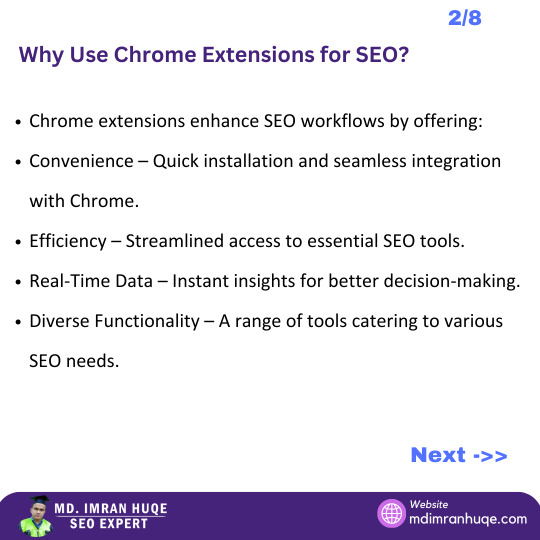
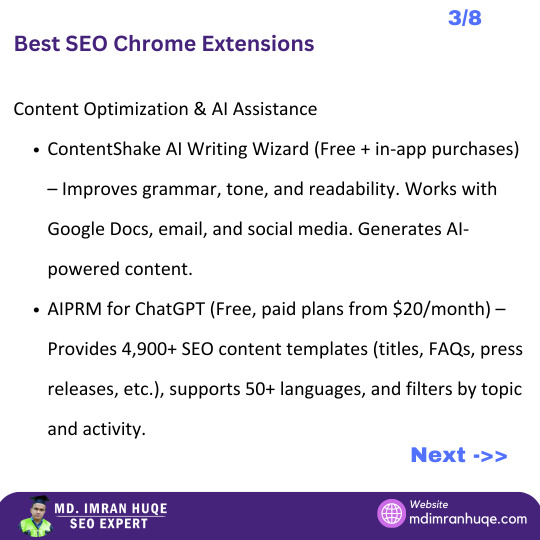
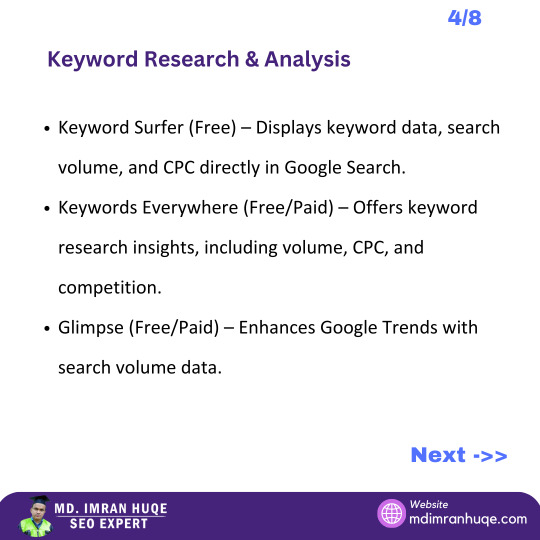
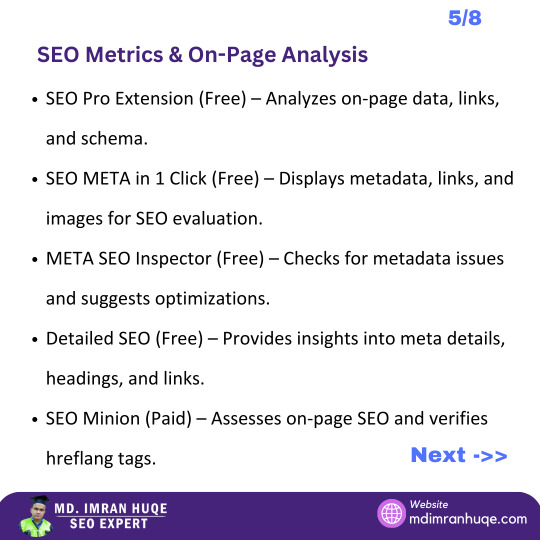
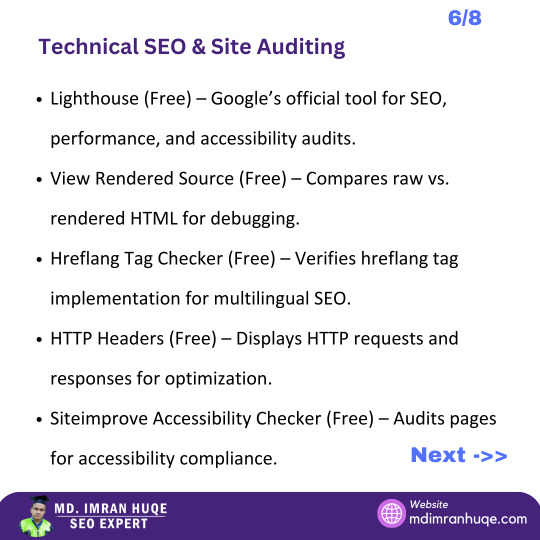
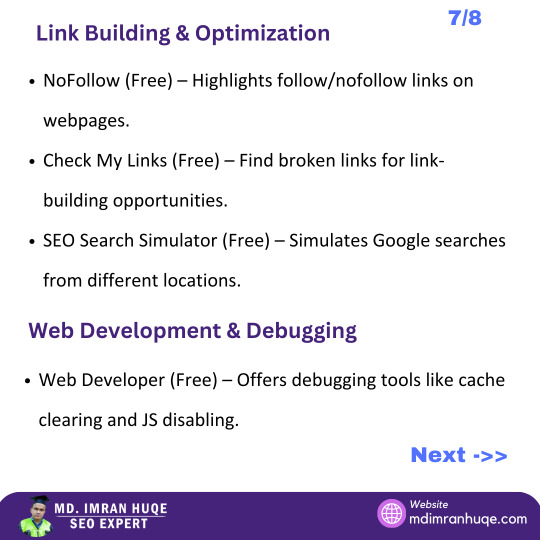
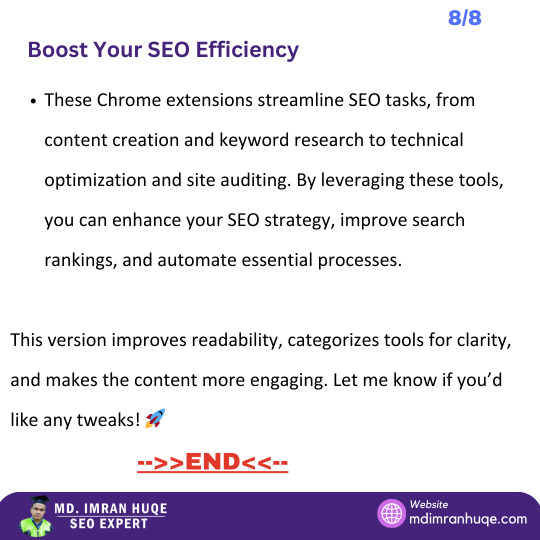
Why Use Chrome Extensions for SEO? Chrome extensions enhance SEO workflows by offering: Convenience – Quick installation and seamless integration with Chrome. Efficiency – Streamlined access to essential SEO tools. Real-Time Data – Instant insights for better decision-making. Diverse Functionality – A range of tools catering to various SEO needs.
Best SEO Chrome Extensions
Content Optimization & AI Assistance ContentShake AI Writing Wizard (Free + in-app purchases) – Improves grammar, tone, and readability. Works with Google Docs, email, and social media. Generates AI-powered content. AIPRM for ChatGPT (Free, paid plans from $20/month) – Provides 4,900+ SEO content templates (titles, FAQs, press releases, etc.), supports 50+ languages, and filters by topic and activity.
Keyword Research & Analysis Keyword Surfer (Free) – Displays keyword data, search volume, and CPC directly in Google Search. Keywords Everywhere (Free/Paid) – Offers keyword research insights, including volume, CPC, and competition. Glimpse (Free/Paid) – Enhances Google Trends with search volume data.
SEO Metrics & On-Page Analysis SEO Pro Extension (Free) – Analyzes on-page data, links, and schema. SEO META in 1 Click (Free) – Displays metadata, links, and images for SEO evaluation. META SEO Inspector (Free) – Checks for metadata issues and suggests optimizations. Detailed SEO (Free) – Provides insights into meta details, headings, and links. SEO Minion (Paid) – Assesses on-page SEO and verifies hreflang tags.
Technical SEO & Site Auditing Lighthouse (Free) – Google’s official tool for SEO, performance, and accessibility audits. View Rendered Source (Free) – Compares raw vs. rendered HTML for debugging. Hreflang Tag Checker (Free) – Verifies hreflang tag implementation for multilingual SEO. HTTP Headers (Free) – Displays HTTP requests and responses for optimization. Siteimprove Accessibility Checker (Free) – Audits pages for accessibility compliance.
Link Building & Optimization NoFollow (Free) – Highlights follow/nofollow links on webpages. Check My Links (Free) – Find broken links for link-building opportunities. SEO Search Simulator (Free) – Simulates Google searches from different locations.
Web Development & Debugging Web Developer (Free) – Offers debugging tools like cache clearing and JS disabling.
Boost Your SEO Efficiency These Chrome extensions streamline SEO tasks, from content creation and keyword research to technical optimization and site auditing. By leveraging these tools, you can enhance your SEO strategy, improve search rankings, and automate essential processes.
This version improves readability, categorizes tools for clarity, and makes the content more engaging. Let me know if you’d like any tweaks! 🚀
To get more information about SEO Chrome Extensions, you can visit now my website:-
jfssoftware.com
0 notes
Text
Best Shopify Optimization Services for Faster Load Times & Higher Rankings
In the present serious online business scene, having a slow-loading Shopify store can hurt your rankings, changes, and in general user experience. To remain ahead, it is vital to put resources into Shopify optimization services. A very optimized store guarantees quicker load times, better website design enhancement rankings, and further developed user commitment. In this aid, we'll investigate the best Shopify optimization services to assist you with improving Shopify store speed and upgrading your online achievement.

Why Speed Optimization Matters for Shopify Stores
Prior to plunging into the best service, how about we comprehend the reason optimizing your Shopify store speed is fundamental?
Higher Search Engine Rankings: Google focuses on quick-loading sites in search rankings.
Better User Experience: Users are bound to remain on a site that heaps inside 2–3 seconds.
Increased conversion rates: Studies demonstrate that a 1-second deferral can decrease transformations by 7%
Lower Bounce Rates: Quicker stores keep users connected with and decrease bounce rates.
Improved Mobile Performance: With mobile-first indexing, speed optimization is a must.
Now, let's explore the best Shopify optimization services to help you achieve these benefits.
Top Shopify Optimization Services for Faster Load Times & Higher Rankings
1. Shopify Speed Optimization by PageFly
Page Fly is a trusted name when it comes to Shopify page building and speed optimization. Their service includes:
Code minification & compression
Image optimization
Lazy loading implementation
Unused script removal
This service ensures a seamless shopping experience while boosting your Google Page Speed score.
2. Tiny IMG: Image Compression & SEO Booster
Optimizing images is a key aspect of Shopify Optimization Services. Tiny IMG helps with:
Automatic image compression
Lazy loading for faster performance
SEO-friendly image optimization
Broken link checker
By reducing image sizes, Tiny IMG significantly improves load times without compromising quality.
3. Shopify Plus Speed Optimization Services
For high-traffic Shopify Plus stores, advanced optimization is necessary. Shopify Plus experts offer:
Advanced CDN setup
Server-side rendering (SSR) improvements
Backend performance enhancements
Custom script management
These techniques help large-scale stores maintain speed even with high visitor loads.
4. Minified: CSS & JavaScript Optimization
Minified helps store owners optimize Shopify store speed by reducing unnecessary code. This tool focuses on:
Minifying CSS and JavaScript files
Removing redundant scripts
Improving browser caching
By advancing your store's code, you can decrease page load times and further develop user engagement.
5. Nitro Pack: All-in-One Speed Optimization
Nitro Pack is one of the most comprehensive Shopify optimization services. It provides:
Automatic speed enhancement
Advanced caching solutions
Image & code optimization
Cloud-based CDN integration
This tool is excellent for store owners who want a hands-free speed optimization solution.
6. AMP by Shop Sheriff—Mobile Speed Booster
With Google’s mobile-first indexing, Accelerated Mobile Pages (AMP) can help your store rank higher. This service offers:
AMP-powered product pages
Faster mobile load speeds
Improved mobile UX
If mobile traffic is a major part of your sales, AMP by Shop Sheriff is a must-have.
7. Speed Boost: Expert Shopify Performance Service
Speed Boost is a Shopify-focused agency specializing in performance improvements. Their services include:
Manual performance audits
App & script optimization
Image and code compression
With a team of Shopify experts, Speed Boost ensures your store meets Google’s performance guidelines.
8. Shopify Store Optimization by WebEx
WebEx provides professional Shopify SEO and speed optimization services, such as:
Site speed audits
Custom optimization strategies
Technical SEO fixes
This help is great for storekeepers searching for a full-service way to deal with enhanced Shopify store speed and further develop rankings.
How to Choose the Best Shopify Optimization Service
With such countless choices accessible, how would you pick the right Shopify optimization services? Here are a few factors to consider:
Your store’s needs; identify whether you need basic speed enhancements or advanced backend optimizations.
Budget: A few services are free or low expense, while others require a venture.
Technical expertise: If you lean toward a hands-off approach, pick a completely managed solution.
Customer Reviews: Check user surveys and tributes to guarantee dependability.
Support & Maintenance: Look for services that offer ongoing support and updates.
Conclusion
Enhancing your Shopify store speed is as of now not optional; it's a need for better search rankings, user experience, and deals. Putting resources into Shopify Optimization Services can definitely work on your site's presentation, keeping you in front of competitors. Whether you pick picture pressure devices like Tiny IMG, full-service optimization like Nitro Pack, or master reviews from Speed Booster, each helps assume an imperative part in supporting your Shopify store's speed.
#appdevelopment#customdevelopment#custom shopify development services#shopifythemedevelopment#shopifywebsitedevelopment#shopifywebsitemaintenance#shopifywebsitemaintenanceservices#shopify support and maintenance services#ecommerceagency#shopifyoptimizationservices#dropshipping#home business dropshiping#dropship web hosting#shopifydevelopment#shopify experts#shopify development company#smallbusiness#shopify#shopify ecommerce development#shopify web development
1 note
·
View note
Text
How to fix Page Not Found error for a website?
To fix a "Page Not Found" error (404 error) for a website, follow these steps:
1. Check the URL
Typo or Mistake: Double-check if the URL entered is correct. Often, this error occurs due to a small typo in the web address.
URL Structure: If you recently changed the URL structure or renamed pages, ensure that the new URL is being used.
2. Redirect Old URLs
If you have changed URLs, set up 301 redirects. This ensures that old URLs automatically redirect users to the new pages. This can be done through:
.htaccess file (Apache): Add a rule to redirect old URLs to the new ones.
301 Redirect plugin (for WordPress): Use a plugin like "Redirection" to manage redirects easily.
CMS settings: Most content management systems (e.g., WordPress, Shopify) allow you to set redirects in the admin panel.
3. Restore or Fix Missing Pages
Check Your Server: Sometimes the page could have been accidentally deleted or moved. Ensure the file is available on the server and the correct file path is being used.
Recreate Pages: If the page was removed intentionally, consider recreating it or setting up a custom 404 page to guide users.
4. Update Internal Links
Check for Broken Links: Use tools like Google Search Console or third-party tools like Screaming Frog or Dead Link Checker to find broken internal links and update them.
Fix or Remove Links: Update internal links to point to the correct, existing pages, or remove them if the page no longer exists.
5. Check the Server Configuration
Web Server Logs: Look at your server logs to identify where the problem lies. It may be a misconfigured server issue.
Content Delivery Network (CDN): If you’re using a CDN, make sure it’s properly syncing with your server and not caching outdated pages.
6. Clear Browser and Server Cache
Clear Cache: Sometimes, browsers cache error pages. Try clearing your browser cache and check again.
Clear Server Cache: If you're using a caching system (like Varnish or a plugin), clear the cache so the server fetches the updated pages.
7. Custom 404 Page
Create a User-Friendly 404 Page: Even with all the fixes, some 404 errors are unavoidable. Create a custom 404 page that:
Apologizes for the error.
Provides links to popular pages, categories, or the homepage.
Includes a search bar to help users find what they were looking for.
8. Use a Plugin (For CMS users)
If you’re using platforms like WordPress or Shopify, install relevant plugins that automatically handle 404 errors, check for broken links, and even redirect pages.
9. Check Your Sitemap
Ensure that your sitemap is up-to-date and includes the correct URLs for all active pages. Submit this updated sitemap to Google Search Console to ensure search engines can index your site properly.
10. Monitor with Google Search Console
404 Errors Report: Regularly monitor the 404 errors reported in Google Search Console. This will help you track broken links or missing pages over time, so you can address them quickly.
By following these steps, you can minimize and eventually fix any "Page Not Found" errors on your website, ensuring a better user experience and maintaining SEO health.
We will help you. visdit digiluxo

0 notes
Text
10 Technical SEO Issues You Could Be Facing Right Now

As websites and online business grow and change over time, it is easy for technical SEO issues to start move slowly in without you even realizing it. These issues could be slowing down your site's performance and lowering its rankings on search engines like Google. By proactively addressing common technical SEO problems, you can keep your site running smoothly and appearing higher in search results.
In this, we will cover 10 technical SEO issues that could be affecting your website right now without you knowing it. For each issue, we will explain what causes the problem and provide suggestions on how to fix it. Let's see!
Slow Page Speed:
If your website pages are taking too long to load, it is bad for both your users and search engines. Slow page speeds lead to high bounce rates as users get impatient waiting and leave your site. Google also considers speed as a ranking factor, so slow pages can negatively impact your rankings.
To check page speed, use Google's PageSpeed Insights tool. It will analyze your site and identify areas for optimization like reducing image file sizes, minifying CSS/JavaScript, enabling browser caching, etc. Work on the biggest opportunities first to see fast improvements. Consider a content delivery network (CDN) and image optimization tool to boost speed.
Broken Links:
Internal broken links on your site cause a poor user experience. They also indicate to Google that your site's structure and content may be outdated or incomplete. Broken links can deflate your site's crawl budget and restrict Google's ability to properly index all your pages.
Regularly audit your site for broken internal links using a broken link checker tool. Fix or remove links redirecting to 404 errors. You can also use the HTML tag to indicate to Googlebot a link is intended to be broken temporarily.
Duplicate Content Issues:
Duplicate content confuses search engines on which version to show in search results. It can also cause your site to lose PageRank if Google does not know which page to consider the original. Common causes of duplicate content include duplicate product pages or having the same content across multiple domain extensions or directories.
Use a tool called Copyscape to check if any of your website content is the same as content on other websites. Consider using the rel="canonical" link tag or HTTP headers to tell search engines which page is the original. Simplify URLs, avoid parameter duplication, and use 301 redirects where possible to consolidate content.
Lack of Sitemaps:
Sitemaps allow you to inform Google and other search engines about the structure of your site and all URLs you want crawled and indexed. Without sitemaps, search engines have to discover your site through links alone which can be incomplete.
Generate an XML sitemap of your pages and submit it through Google Search Console. Make sure to include any new/updated pages regularly. For large sites, use a Sitemap index file. Also create XML sitemaps for images, videos or other non-HTML content if applicable.
Low Quality or Thin Content:
Websites with pages that have too little content, don't use keywords well, or don't provide useful information might be seen as low quality by search engines. "Content mills" that create cheap, low-quality content can also be a problem. Even though short summaries alone won't hurt your rankings, if you have too many pages with little content on your website, it could affect how search engines crawl your website and how they think you're an expert on a certain topic.
Conduct an audit to identify weak pages. Fill out thin pages by adding more keywords, internal links and rich information from your subject matter expertise. Remove any copied or spun text from content mills. High quality, original content should remain the focus over shallow word counts alone.
Poor Mobile Experience:
As mobile search continues to grow, optimizing the mobile experience of your site is crucial. Issues like slow load times, Non-responsive designs, and missing meta details are sub-par for mobile users. Google uses separate mobile-first indexing and requires every page be accessible across devices for best results.
Use Google's Mobile Friendly Test and PageSpeed Insights mobile testing to diagnose issues. Implement a responsive web design, optimize images, and minify resources. Add important meta tags like viewport. Verify your site across different device make sure it looks and works correctly on all of them. A good mobilized site increased the user experience.
Incorrect Technical Configuration Issues:
Overly restrictive server settings, incorrectly implemented scripts, misconfigured metadata and more can cause technical hiccups that also impact SEO performance. Crawling issues like blocking user-agent strings prevents proper indexing.
Check your HTACCESS files, robots.txt, and server configs for errors. Verify proper implementation of sitemaps, canonicals and XML metadata. Monitor server health indicators like load times and error logs. Ask your hosting provider assistance in troubleshooting any misconfigured aspects impacting spiders or users.
Outdated CMS or Plugins:
When content management systems (CMS) or plugins powering key site functions go outdated or unsupported, new exposure can occur. Older plugins may lack features available in modern version, and outdated CMS platforms could lose optimization capabilities. Not upgrading regularly risks technical or security faults.
Check your CMS version against their official lifecycle policies for end of support dates. Audit all themes and plugins for updates. Make sure to update the important tools that help keep your website secure, fast, and running smoothly. This will help prevent problems from happening over time as the software changes. Consider a newer CMS if yours has reached its end-of-life.
Poor Internal Link Structure:
How you architect internal linking between pages on your site impacts both usability and SEO. Issues like excessive deep links, cluttered menus, orphaned pages, and lack of incoming links to important content can confuse crawlers or signal less important pages to Google.
Audit your site map for conceptual "clusters" of topically related pages. Streamline your navigation and internal linking based on importance and user tasks. Orphan/thin pages may need more incoming links or consolidation. Use internal link analyses to identify opportunities to strengthen the contextual connectivity of related pages for SEO and users alike.
Inadequate Cybersecurity Protections:
Websites that contain harmful software. Infected files, or exploitable vulnerabilities damage user trust and search ranking potential. Security issues that let malicious software actions through also risk manual Google spam penalties beyond just algorithmic drops. Ensure proper protocols are in place to safeguard users and your online presence.
Run security scans to audit for vulnerabilities using tools like SiteCheckup or SecurityTrails. make sure systems have the latest patches and your hosting provider uses SSL/TLS. Review firewall/security configurations.Educate yourself on best security practices and monitor alerts for infection symptoms year-round. Proactive protection maintains both safety and your SEO visibility.
Wrapping Up
No site is perfect, and technical SEO issues are easy to overlook day-to-day. However, focusing on these 10 common problem areas can go a long way in optimizing site speed, structure and safety fundamentals for both users and search engines alike. Implementing fixes for even a few of the highest impact issues routinely should keep your online presence running smoothly and help search engines understand and highlight your web pages properly.
If you are in Patna, think about contacting an SEO company service in patna they have cutomised plan that suit your business needs well. Also, a digital marketing firm could provide strategies that include everything from SEO & content marketing to social media management—all tailor made for improving online presence!
So if any of those signs hit contact Skylab SEO company in patna for getting some fresh SEO services—it could be great for helping future success happen.
#marketing#logo design#graphic design#infographic#Digital marketing#SEO#SEM#SMM#PPC#Website designing#Graphic designing#Google Ads#Meta Ads#Email Marketing#Advertising
0 notes
Text
Track Your Website’s Google Ranking with ToolsPing’s Free SERP Checker Tool
In the digital age, visibility on Google determines the success or failure of a website. Whether you run a blog, an eCommerce store, or a corporate website, your position on search engine results pages (SERPs) can directly affect your traffic, leads, and ultimately your revenue. Understanding where your site ranks for targeted keywords is vital — and that’s where ToolsPing’s Free SERP Checker Tool comes in.
At ToolsPing, we offer a powerful yet simple solution for anyone looking to monitor and optimize their SEO performance without the hassle of registration, downloads, or expensive software subscriptions. Our Free SERP Checker Tool is designed for immediate use, offering real-time insights into your keyword rankings on Google — completely free of charge.
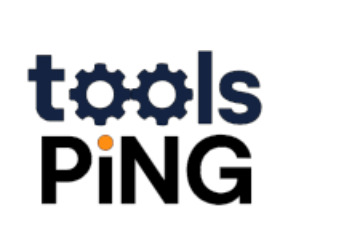
What Is a SERP Checker Tool and Why Do You Need One?
A SERP (Search Engine Results Page) Checker Tool is an SEO utility that allows you to analyze where your website ranks on Google for a specific keyword or search phrase. These tools are essential for:
Tracking SEO campaigns
Analyzing keyword performance
Monitoring competitors
Understanding organic visibility
Identifying SEO opportunities
Whether you're an SEO specialist or a business owner, a Free SERP Checker Tool provides essential data that guides your content strategies and optimization efforts.
Introducing ToolsPing’s Free SERP Checker Tool
Our Free SERP Checker Tool at ToolsPing is an intuitive, easy-to-use platform tailored for users who want instant results without any learning curve or login barrier.
Key Features:
Instant Keyword Position Tracking Enter your target keyword and domain, and our tool will instantly display where your site ranks on Google.
No Sign-Up Required Start checking your rankings right away — no email, no registration, no waiting.
Multi-Device Compatibility Use it on desktop, tablet, or mobile. Our platform is responsive and optimized for all devices.
Global Search Options Track keyword rankings in various countries and regions to support your international SEO strategies.
Clean, User-Friendly Interface Our tool is designed for clarity. Whether you're a seasoned SEO expert or a beginner, you’ll navigate with ease.
Why Use ToolsPing’s Free SERP Checker Tool Over Others?
Many SERP tools on the market come with hidden limitations — usage caps, mandatory sign-ups, or premium-only features. At ToolsPing, we offer complete transparency and accessibility.
Here’s why we stand out:
Truly Free: No hidden charges, no freemium traps — just pure SERP data at no cost.
Real-Time Results: Get accurate, live Google ranking data, not outdated cached info.
Unlimited Searches: Check as many keywords and domains as you want, any time.
Privacy Guaranteed: No data tracking, no personal information collected.
This makes our Free SERP Checker Tool the ideal choice for students, small business owners, digital marketers, and SEO professionals alike.
How to Use the Free SERP Checker Tool on ToolsPing
Getting started is as easy as it gets:
Visit ToolsPing’s Free SERP Checker Tool page.
Enter your domain name (e.g., www.yoursite.com).
Type in the keyword you want to check.
Select your target country (optional).
Click the "Check SERP" button.
Within seconds, you’ll see exactly where your website ranks for that keyword on Google.
Benefits of Regularly Checking Your Google Rankings
Using a Free SERP Checker Tool regularly ensures that you stay informed about your SEO health. Here are some of the key benefits:
Track Progress Over Time
Monitor how your rankings improve as you implement new SEO strategies or publish fresh content.
Identify Drop-Offs Quickly
Spot when rankings fall so you can take immediate corrective action.
Understand Competitor Movements
See how you compare with competitors and respond to shifts in search position.
Optimize Content Efficiently
Focus your optimization efforts on keywords that matter most and yield the best ROI.
Improve Local and Global Reach
Track location-specific keywords to tailor content for regional SEO campaigns.
Who Should Use ToolsPing’s Free SERP Checker Tool?
This tool is perfect for:
Freelancers and bloggers optimizing their articles and content
Business owners wanting to track product or service visibility
SEO agencies managing client keyword positions
eCommerce websites analyzing product keyword performance
Students learning about search engine marketing in real time
If you care about search visibility, you need a reliable, real-time, and Free SERP Checker Tool — and ToolsPing delivers exactly that.
Boost Your SEO Strategy with ToolsPing
Ranking well on Google doesn’t happen by chance. It requires consistent effort, strategic insights, and reliable tools. With ToolsPing’s Free SERP Checker Tool, you get the clarity and direction needed to improve your search performance without paying a cent.
Our mission is to empower webmasters, content creators, and digital marketers by providing fast, accurate, and free SEO tools that make a difference.
Don’t let your website’s potential go untapped. Stay on top of your rankings and adapt your SEO strategies with real data. ToolsPing is your trusted partner in navigating the ever-changing world of search engine optimization.
0 notes
Video
youtube
Best Google Cache Checker Tools For Free
0 notes
Text
Technical SEO: Improving Site Performance and Crawlability
Technical SEO is the backbone of a strong online presence. It focuses on improving website structure, speed, and crawlability for better search engine visibility.
Key elements of technical SEO:
Website Speed: Optimize images, minimize code, leverage browser caching for faster load times.
Mobile Friendliness: Ensure your site is responsive and user-friendly on all devices.
XML Sitemap: Create a sitemap to guide search engines through your website's structure.
Robots.txt: Control search engine crawlers' access to specific pages.
URL Structure: Use clear and descriptive URLs for better organization.
A strong technical foundation is crucial for SEO success. Tools like a website domain authority checker can help assess your site's overall strength. If you need expert assistance, consult an SEO specialist.
Technical SEO: A Deep Dive into Website Optimization
Technical SEO is often overlooked but plays a crucial role in improving your website's search engine rankings. Let's explore key aspects of technical SEO in more detail.
Website Speed Optimization
Image Compression: Reduce image file sizes without compromising quality.
Minify Code: Remove unnecessary characters from HTML, CSS, and JavaScript files.
Leverage Browser Caching: Store static resources locally to reduce loading times.
Content Delivery Network (CDN): Distribute content across multiple servers for faster delivery.
Mobile Friendliness
Responsive Design: Create a website that adapts to different screen sizes.
Mobile-First Indexing: Optimize your site for mobile users as Google prioritizes mobile-friendly content.
Test Mobile Friendliness: Use Google's Mobile-Friendly Test to identify issues.
XML Sitemap and Robots.txt
XML Sitemap: Create a sitemap to help search engines discover and index your pages.
Robots.txt: Control search engine crawlers' access to specific pages or directories.
URL Structure
Keyword-Rich URLs: Incorporate relevant keywords into your URLs.
Clear and Concise: Use descriptive and easy-to-understand URLs.
Avoid Duplicate Content: Create unique URLs for different pages.
Crawlability
Internal Linking: Create a clear navigation structure with internal links.
Broken Links: Fix broken links to improve user experience and search engine crawling.
Site Architecture: Organize your website logically for efficient crawling.
Technical SEO Tools
Google Search Console: Monitor website performance, identify issues, and submit sitemaps.
Google PageSpeed Insights: Analyze website speed and get optimization recommendations.
Mobile-Friendly Test: Check your website's mobile-friendliness.
Website Domain Authority Checker: Assess your website's overall authority.
Remember: Technical SEO is an ongoing process. Regularly monitor and optimize your website to maintain optimal performance and search engine visibility.
By investing time and effort in technical SEO, you can create a solid foundation for your website's success. If you need expert assistance, consider consulting with an SEO specialist.
0 notes
Text
Website Maintenance: Keeping Your Online Home in Top Shape
Imagine your website as your digital storefront. It's where potential customers come to browse your products, learn about your services, and hopefully, convert into loyal fans. But just like a physical store, a website needs regular maintenance to keep it running smoothly and looking its best.
This might sound intimidating, especially if you're not particularly tech-savvy. But fear not! Website maintenance doesn't have to be a complex or time-consuming process. In fact, with a few simple steps, you can ensure your website remains a positive reflection of your brand and continues to attract visitors.
Why is Website Maintenance Important?
Think of it this way: a neglected website is like a dusty, cluttered shop window. Potential customers might peek in, but they're unlikely to be impressed or feel compelled to enter. Here's why website maintenance is crucial:
Improved User Experience (UX): A well-maintained website is easy to navigate, loads quickly, and provides a seamless browsing experience. This keeps visitors engaged and increases the chances of them converting into leads or sales.
Enhanced Security: Websites are constantly under threat from hackers. Regular updates and security checks ensure your website is protected from malware and data breaches, keeping your visitor information safe.
Search Engine Optimization (SEO): Search engines like Google prioritize websites that are fresh, relevant, and mobile-friendly. Regular maintenance helps your website rank higher in search results, leading to more organic traffic.
Greater Credibility and Trust: A polished and up-to-date website portrays a professional and trustworthy image. This builds confidence in your brand and encourages visitors to do business with you.
Website Maintenance Made Easy: A Step-by-Step Guide
Now that we understand the importance of website maintenance, let's break it down into manageable steps. Here's what you need to do:
1. Content Updates:
Fresh content keeps your website interesting and engaging for visitors. Regularly update your blog with new articles, add new product descriptions, or showcase your latest projects.
Review your existing content and make sure it's still accurate and relevant. Update information as needed, such as pricing, contact details, or event dates.
Optimize your content with relevant keywords to help your website rank higher in search results. There are many free keyword research tools available online.
2. Security Measures:
Update Your Software: Outdated software can contain vulnerabilities that hackers exploit. Make sure your website platform, plugins, and themes are always up-to-date with the latest security patches.
Strong Passwords: Use strong and unique passwords for all your website accounts. Consider a password manager to help you keep track of them securely.
Regular Backups: Regularly back up your website data. This ensures you can recover information in case of a cyberattack or technical malfunction. Many website hosting providers offer automatic backup services.
3. Performance Optimization:
Fast Loading Speeds: Nobody likes a slow website. Ensure your website images are optimized for size, and consider caching plugins to improve page load times. Several free tools online can help you analyze your website's speed and identify areas for improvement.
Mobile-Friendly Design: In today's mobile-first world, it's crucial that your website is responsive and looks good on all devices. Most website platforms offer responsive design options, or you can consider a mobile-specific theme.
Broken Links: Broken links lead to frustrated visitors and negatively impact your SEO. Use broken link checker tools to identify and fix broken links on your website regularly.
4. Analytics Tracking:
Monitor Website Traffic: Use website analytics tools like Google Analytics to track website traffic, user behavior, and conversion rates. This data helps you understand what's working on your website and identify areas for improvement.
Analyze User Journey: Understand how visitors navigate your website and what content they engage with. This helps you optimize your website for better user experience and improved conversions.
Set Goals: Track key metrics that are important to your business, such as lead generation, sales conversions, or website sign-ups. This helps you measure the effectiveness of your website and marketing efforts.
5. Ongoing Maintenance:
Schedule regular time for website maintenance tasks, even if it's just a few minutes each week. This could involve updating content, checking for broken links, or reviewing analytics reports.
Consider hiring website maintenance services if you don't have the time or technical expertise to manage it yourself. Many web developers and digital marketing agencies offer website maintenance packages to keep your website running smoothly.
Conclusion: Don't Let Your Website Become a Digital Dust Bunny!
Regular website maintenance is an investment in your online success. It ensures your website delivers a positive user experience
0 notes
Text
Elevating SEO Strategy: Harnessing the Power of the Website Links Count Checker Tool

In the multifaceted realm of Search Engine Optimization (SEO), understanding the intricate web of links on your website is crucial. The Website Links Count Checker Tool at MySEOToolkit.com is an essential asset, providing you with detailed insights into the quantity and quality of links on your web pages. This article will explore the importance of link analysis in SEO, the benefits of using MySEOToolkit.com’s Website Links Count Checker Tool, and the extensive range of additional tools available on the platform.
The Critical Role of Link Analysis in SEO
1. **Understanding Link Structure**: A thorough analysis of links on your website can offer insights into the site's structure, highlighting how pages are interlinked and the overall navigability of the site.
2. **Assessing Link Quality**: Not all links are created equal. Understanding the balance between internal and external links, and assessing the quality of those links, is vital for SEO. High-quality, relevant links can significantly enhance your site's authority and ranking.
3. **Identifying and Addressing Issues**: Excessive links or broken links can negatively impact user experience and your site's SEO performance. A comprehensive link count can help identify these issues, allowing for timely resolution.
4. **Optimizing Link Strategy**: By understanding your current link structure, you can make informed decisions about your link-building strategy, focusing on areas that offer the most potential for improvement.
Utilizing MySEOToolkit.com's Website Links Count Checker Tool MySEOToolkit.com’s Website Links Count Checker Tool is a powerful solution for webmasters, SEO professionals, and digital marketers. Here’s how it adds value to your digital strategy:
1. **Detailed Link Insights**: The tool provides a detailed breakdown of the number of internal and external links on your web pages, allowing you to assess the effectiveness of your link strategy at a glance.
2. **Identifying Broken Links**: The tool can help identify broken or problematic links, ensuring that every link on your site adds value and doesn't detract from the user experience or SEO performance.
3. **Simple and Efficient**: With an easy-to-use interface, the Website Links Count Checker Tool allows you to quickly get the link count information you need, enabling you to focus on strategic decision-making and optimization.
Leveraging a Comprehensive Suite of Tools at MySEOToolkit.com While the Website Links Count Checker is crucial for assessing your website's link structure, it’s just one component of a comprehensive digital strategy. MySEOToolkit.com offers an extensive array of tools to address all your SEO and web management needs:
1. **Website Screenshot Generator**: Capture high-quality screenshots of your website, providing a visual record for documentation, analysis, or presentation.
2. **Reverse IP Domain Checker**: Understand your hosting environment and the potential impact of your digital neighbors on your site's reputation and SEO.
3. **Keyword Density Checker**: Maintain the perfect balance in your content with precise keyword density analysis, enhancing content relevance and SEO performance.
4. **Google Cache Checker**: Verify that your content is up-to-date in Google's search results by checking the last cached versions of your web pages.
Conclusion Link analysis is a fundamental aspect of SEO, offering insights into the structure, quality, and effectiveness of the links on your website. MySEOToolkit.com’s Website Links Count Checker Tool provides a straightforward, efficient solution for monitoring and optimizing your website's links. Coupled with a comprehensive range of other SEO and web management tools, MySEOToolkit.com equips you with everything you need to optimize your website’s performance, enhance your SEO strategy, and maintain a competitive edge in the digital marketplace. Explore the full spectrum of tools available at MySEOToolkit.com and take a proactive step towards optimizing your website's link structure and overall SEO success.
1 note
·
View note
Text
7 Best WordPress Plugins For SEO
In the ever-evolving digital landscape, the significance of search engine optimization (SEO) cannot be overstated. Whether you're a seasoned webmaster or just stepping into the world of online content creation, WordPress is a platform that needs no introduction. Its user-friendly interface and wide array of plugins make it a go-to choice for website development. To excel in the online arena, optimizing your WordPress site is crucial. With that in mind, SEO Services in Chandigarh present to you the seven best WordPress plugins for SEO that will empower your website and help you secure a coveted spot in Google's search results.
1. Yoast SEO
Yoast SEO is the quintessential WordPress plugin for optimizing your website's content. It provides a user-friendly interface that assists in on-page SEO. With features like content analysis, readability checks, and XML sitemap generation, Yoast SEO is a one-stop-shop for improving your site's search visibility. It also helps you craft SEO-friendly meta titles and descriptions, ensuring your website stands out in search engine results.
2. All in One SEO Pack
Much like Yoast SEO, the All in One SEO Pack is a robust plugin that streamlines SEO optimization. This plugin is ideal for beginners, as it comes with essential features such as XML sitemap creation, Google AMP support, and social media integration. It ensures your website is search-engine-friendly without requiring advanced SEO knowledge.
3. SEOPress
SEOPress is a powerful yet user-friendly plugin that caters to both beginners and experts. It offers features like schema markup, Google Analytics integration, and local SEO options. With SEOPress, you have complete control over your website's meta tags, redirects, and canonical URLs, enabling you to fine-tune your SEO strategy.
4. Rank Math
Rank Math is another SEO powerhouse that provides a comprehensive set of tools to enhance your website's SEO performance. Its clean and intuitive interface makes it suitable for all skill levels. With features like advanced SEO analysis, schema markup, and XML sitemap support, Rank Math helps you stay ahead in the search engine rankings.
5. Broken Link Checker
Maintaining a healthy website is essential for SEO success. Broken links can hinder user experience and impact your search rankings. The Broken Link Checker plugin automatically scans your website for broken links and missing images, allowing you to fix them promptly. By ensuring your site's integrity, you can improve SEO performance.
6. WP Super Cache
Site speed is a critical factor in SEO. Slow-loading websites tend to rank lower in search results. WP Super Cache is an exceptional plugin for optimizing your website's speed. It generates static HTML files, reducing server load and improving load times, ultimately boosting your SEO efforts.
7. Redirection
Properly managing redirects is essential for SEO. The Redirection plugin simplifies this task by enabling you to set up 301 redirects and monitor 404 errors. By efficiently handling redirects, you can preserve your website's link equity and ensure users find the content they're looking for.
In conclusion, these seven WordPress plugins for SEO are indispensable tools for enhancing your website's search engine visibility. Whether you're an SEO novice or an expert, these plugins cater to all skill levels, making the process of optimizing your WordPress website a breeze. Remember, SEO is an ongoing process, and these plugins will be your trusted companions on your journey to outrank your competitors in Google's search results.
0 notes